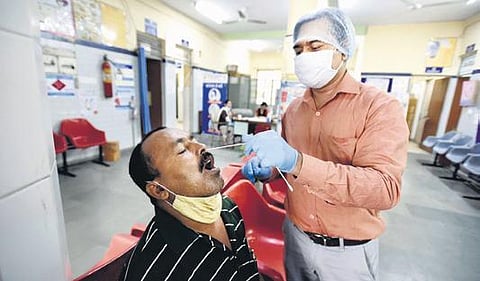

BENGALURU: Genome sequencing (GS) tests on samples of 30 Covid-19 infected persons as well as sewage surveillance has indicated that the sudden spurt in Covid cases in Bengaluru has been due to two sub-lineages of the Omicron variant of SARS-CoV-2 virus, which causes the disease. However, the Indian Sars-CoV-2 Genomics Consortium (INSACOG) at the national level is yet to confirm this, according to health department officials, who said this is not yet the fourth wave of the pandemic.
The two sub-lineages, BA.4 and BA.5, were detected in waste water analysis — or sewage surveillance — done in multiple samples in Bengaluru. The reports of GS tests of samples of the 30 people who had tested positive for RT-PCR tests, revealed the presence of BA.4 and BA.5, while reports of tests conducted on samples of 370 other infected people are awaited.
“The viral load analysis of waste water of over 100 samples from sewage treatment plants, manholes, and open drains was done in all wards of Bengaluru this month. These BA.4 and BA.5 sub-lineages of Omicron are being mainly found in samples of waste water of Bellandur, where nine clusters are found,” officials said. However, Health Commissioner D Randeep said, “There is neither a steady nor exponential rise in cases or multiple clustering cases. So we cannot term it as the fourth wave yet.”
Meanwhile, a Covid Technical Advisory Committee (TAC) member said: “Unless a new ‘Variant Of Concern’ (VOC) that is immune-escaping, is reported by the World Health Organisation (WHO) and Centre’s INSACOG and Centres for Disease Control and Prevention (CDC&P), we cannot call the surge in cases the fourth wave of Covid.”
In Bengaluru, while 25 clusters were found in apartments, health officials said most clusters were detected when those travelling abroad underwent Covid tests. In Mahadevapura zone alone, among 24 clusters in apartments, nine clusters are in Bellandur, two are in Hagadur, four in Varthur, one in Kadugodi, one in Horamavu and one in Vignan Nagar. One cluster is in an apartment in Rajarajeshwari Nagar zone, and another in an individual house in Yelahanka. At present, there are 28 clusters in Bengaluru.
“Cases are rising mainly because people are travelling since there are no travel restrictions. Besides, people are not following Covid protocol even in public rallies and spaces, and are showing reluctance in taking the precautionary dose,” said an officer.On Tuesday, Karnataka reported 738 Covid-19 cases, with 698 from Bengaluru.